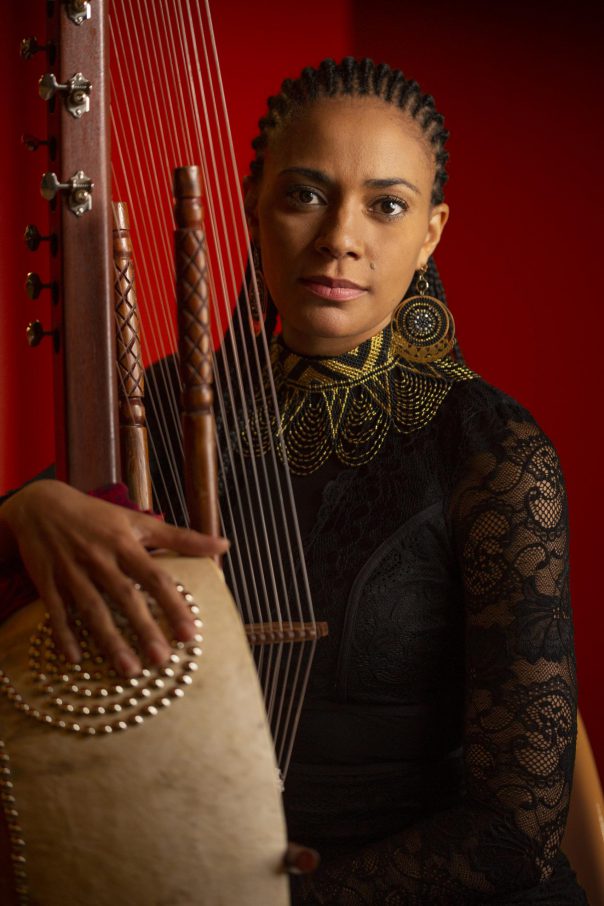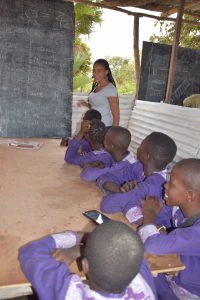Interview: Kora master Sona Jobarteh on education reform in Africa

Sona Jobarteh, courtesy.
For Sona Jobarteh, music isn’t just an artistic pursuit or career, but a responsibility to contribute to society and inspire future generations. That’s something of which she is herself a shining example as the first woman to master the kora. The instrument is a 21-string cross between a harp and a lute played for hundreds of years in West Africa by only a few families that have passed the completely oral tradition from one generation to the next: from father to son.
Sona Jobarteh
8 p.m., Tuesday, Aug. 8
Freight & Salvage, Berkeley
Tickets: $32-$36.
Jobarteh, who was raised in England, has also founded a growing school in The Gambia, teaching not only the kora and other traditional instruments but a complete academic education from an African—rather than colonizer—perspective. For as well-known as she’s become for her music over the years, even getting an honorary doctorate from the Berklee School of Music, joining the likes of Aretha Franklin and Herbie Hancock, she views herself as an educator first and a musician second.
The 39-year-old wrote songs about the responsibilities of artists, the importance for education in Africa to be from an African perspective and other weighty subjects on her 2022 album, Badinyaa Kumoo, which she played on a U.S. tour last spring. All the songs are interconnected, not just through the topics but through the instrumentation, the contributing musicians and the way in which they’re playing.
“Kambengwo,” for example, talks about the need for African unity. The song features iconic Senegalese singer Youssou N’Dour to symbolize people coming together. On the song about education, girls from her school, The Gambia Academy, provide backing vocals.
“I put it in a funky time signature, again to represent innovation and modernity,” she said. “The first song on the album, [Musolou, is] thinking critically about that role that women have to play in the current day society, and how things need to adapt and change and make sure that we’re bringing the best of what we have in our communities.”
Historically and traditionally, Sona Jobarteh was not supposed to learn to play the kora, even though she does come from a line of families known as griots, who are royal storytellers, advisors and historians, passing on culture and traditions. There are five main griot lines in all of West Africa. The men play while the women sing. But Jobarteh asked her older brother, Tunde Jegede, and then her father, to teach her the kora.
“The griots … traditionally were people who did far more than just played music. It’s only in recent times that this commercialization of music has really separated that art form from functional society,” she said. “This tradition was always connected with empire building … and that carried a lot of very male duties, such as going to war, being advisor to the kings… That warrior history, the music part has been retained, and so has the cultural tradition of that being a male-dominated tradition. I really pushed back on that, in the sense that it’s not undermining the tradition, but really just reevaluating its usefulness in the current-day society, where we don’t have to be on the battlefield. Now it should be a good time for us to reassess women’s role within this tradition.”
She kept her playing a secret at first, even to her kora master grandfather, Amadu Bansang Jobarteh, and cousin Toumani Diabaté. Having the support of her immediate family made it possible, she said.
In England, she studied cello, piano, harpsichord and music composition. But she returned to the kora after finding an archive of manuscripts, recordings and other materials from West Africa while at SOAS University of London. She built a strong list of projects, performing with well-known orchestral artists, and was featured on Damon Albarn’s (Blur) 2002 album Malu Music (along with her cousin).
She said that learning the kora was neither more difficult nor easier than her other instruments—all required lots of practice—but that there were more layers besides the technicality of performance. The other part is the tradition and the repertoire.
“There are hundreds of songs that belong to the griots. None of these songs are written down. So it’s an oral tradition fully,” she said.
In a sense, she’s lucky that she was born into a griot family, which allowed her to learn the traditions for years before she picked up the instrument. Musicians without that familial background are at a disadvantage. At The Gambia Academy, the kora and other traditional instruments are taught not only to girls, but to boys who are outside a griot line.
Sona Jobarteh released records in 2008, 2010 and 2011, with the latter being a collection of reworked griot traditional songs and a few originals. Badinyaa Kumoo consists of all originals that use instruments such as the calabash, balafon and djembe, as well as more modern instruments, fusing traditional African folk with jazz, blues and soul. Besides appearances by Malian kora master Ballaké Sissoko and Yemeni blues great Ravid Kahalani, the album includes contributions from Memphis saxophonist Kirk Whalum (who played with Whitney Houston) and Alabama blues harmonica player Jock Webb.
The link from African music—she was careful to point out that her cultural heritage is Mundang, which precedes the modern country of The Gambia by about 700 years—to American music is wholly intentional.
“There is a direct connection, as we all know, between that and the blues and any other musical form that came through and evolved out of that transatlantic slave trade, which took Africans out of West Africa and brought them to the Americas and other parts of the world,” she said. “These musical forms, particularly the blues, are a direct birth out of that journey, and that experience that was brought by Africans.”
Jobarteh singled out the song with Webb, “Nna Kangwo,” to dig even deeper. It’s clearly a blues song, she explained, but her playing on it isn’t the American iteration but rather the genre known as Mali blues or desert blues.
“I’m squarely within my Mundang heritage there. That is a style of music that originates in Mali,” she said. “This music is almost the same but with a very different expression because this is very connected to the life experiences of the people, and obviously the music coming from that region of Mali has a very different expression to musicians coming from the Americas. … I wanted to draw attention to that connection, and the fact that we are obviously on two sides of the same coin.”
More recently, she’s had a song featured in the closing credits of the film “Beast,” starring Idris Elba, which notably takes place in southern Africa rather than west Africa. Director Baltasar Kormákur was a fan of her work and reached out, asking her to write a new piece of music (which became “N’na Duniyaa”) that was not so culturally steeped that it became unrelatable, but still conveyed the essence of Africa. She wrote and performed the song in Zulu, a language spoken in southern Africa, even though most of her other songs are in Mandinka, a western Africa language.

Sona Jobarteh performs during the 2023 Savannah Music Festival at the Lucas Theater Of The Arts in Savannah, Ga. on March 24, 2023. Photo by R. Diamond/Getty Images.
She also collaborated on a song with LL Cool J, for his next album. She said it should be released in the fall. The rapper wanted to pay homage to the kora, she said, and the song is more or less split in half, with the first half written by him and the latter by her.
But her school, and education reform in western Africa, remains her top goal.
“For me it’s very important that children, especially African children, are educated in their own traditions, in their own history, their own culture, so they have a sense of value to it, and they have a sense of orientation that puts their own identity at that centerpiece,” she said.
Follow editor Roman Gokhman at Twitter.com/RomiTheWriter.

